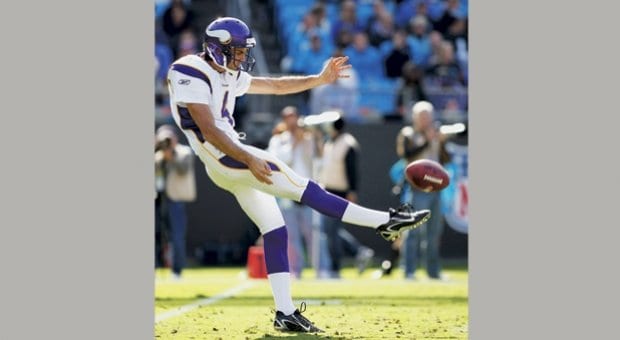Whether or not we can ever definitively prove that homophobia caused Chris Kluwe’s termination, the now-former punter could teach his coaches a thing or two about being a team player.
Kluwe is the former Minnesota Vikings punter who shook the sports world in early January with his allegations that he was cut not for poor performance, but for his vocal support of same-sex marriage in the run-up to Minnesota’s 2012 referendum.
He says he doesn’t regret speaking out, even though it likely cost him his job.
“It’s the basis of a sound society,” he tells me. “People have to be free to live their own lives.”
He says he’d want others to speak out for him if his rights were in jeopardy — even if it cost them their jobs too. The consequences reinforce the need to speak out, he says. If we live in a world where people can be penalized for expressing their views, shouldn’t we “commit to making it better”?
“What kind of world do we want to live in?” he asks. “Is it one where we are free to speak out on important social issues? Or is it one where everyone is tip-toeing around things and worried about saying anything at all because they’re worried about losing their job?”
Kluwe blames the National Football League’s older coaches and administrators for the less-than-warm welcome gay athletes and their more outspoken allies may receive. Though he doesn’t think homophobia is pervasive in the league among players — whom he generally describes as young and supportive, cycling up from college with new attitudes — he says some coaches may be less open-minded.
“I think problems would come from coaches and administrators because they tend to be older individuals [with] a certain mindset,” he says.
Kluwe suggests the key to changing these coaches’ attitudes lies in showing them the player potential they’re failing to capitalize on. If coaches need players to play at their full potential to win as many games as possible, then maybe they’ll be more receptive to the argument that players play best when they’re free to express themselves fully.
“I’ve talked with former players who came out after they finished playing,” Kluwe says, “and their message was that ‘I didn’t feel like I could be myself. I felt like it affected my playing because I was always worried that someone’s going to find out who I am. Is today the day that someone discovers my secret?’
“You can’t play to your full potential that way,” he says, pointing out the obvious.
Nor can you play to your full potential when your coaches label you a “distraction” and turf you for having the courage to stand up for others.
The Vikings deny that Kluwe was released for his activism. They maintain that the decision was “strictly based on his football performance.” I’m skeptical. Given Kluwe’s consistent performance throughout his career and the record-high net average yards he punted in what turned out to be his last season with the team, I think his vocal advocacy for gay rights tipped a previously dormant scale out of his favour.
Asked if he would encourage others to speak out, despite the consequences he faced, Kluwe doesn’t hesitate. “Yeah, there might be consequences for speaking out. Yeah, there is a possibility that you could lose your job. But at the end of the day, if you feel strongly about the issues — you feel that people should be treated with respect and you’re willing to fight for that — accept the consequences,” he says.
“If you’re not willing to risk what you have, then your heart’s probably not in it.”
I know it’s only January, but I’ve already found my straight ally of the year.
Robin Perelle is the managing editor of Xtra Vancouver.

 Why you can trust Xtra
Why you can trust Xtra


